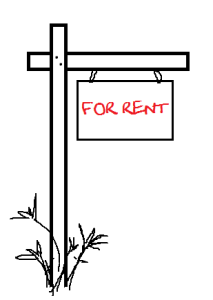5 Tips that Will Help You Rent Your Property

Last week, I wrote a blog entitled, “5 Things that Will Help You Sell your Home.” On a similar theme, today’s topic is aimed at the landlords out there, who are contemplating putting a vacant or soon-to-be-vacant property on the rental market. So, without further adieu, here are 5 Tips (plus a bonus tip coming in off the bench) that will help you rent your property and accomplish your residential income property goals.
Hire a tech-savvy Realtor who will do more than just park your property on the MLS
Lots of would-be tenants shop for rental apartments on their own these days, without the help of an agent. If you’re working with an agent who is behind the times, and who fails to market across as many different online platforms as possible, your property won’t be getting the exposure it deserves.
Tackle the obvious weak points in your property
If you’ve got old, dingy carpeting or scuffed up walls, rest assured that prospective tenants will either beat you up over it in negotiations or pass on your listing altogether. Replacing carpet or applying a fresh coat of paint isn’t all that expensive, and it’ll give you a competitive advantage. That new carpet/paint smell isn’t just appealing to a prospective tenant on a sensory level – it also demonstrates that you, as a landlord, care about offering a nice, clean product for the money you’re expecting.
Price yourself competitively
Landlords who ask too much often sit on vacant property. If you have to knock $25 per month off your asking price to get your place rented to a solid tenant with good credit, do it. It’ll only add up to a few hundred bucks over the course of a year, whereas carrying and paying for an empty unit will cost you that much and more.
Set your tenants up with an auto-pay option
Creating an automated way for your tenants to pay their rent makes life easier for everyone involved. It will ensure that the money hits your account on time every month, and your tenants won’t have to worry about the due date slipping their minds. Chasing a tenant around for payment when the rent is late is uncomfortable for everyone, and it creates an anxious relationship with your tenants. So set something up with your bank or even PayPal, and automate when the money comes in. This one is a no-brainer. . .
Screen applicants as best you can, trust your gut, and then let fate take over
No matter how careful you are, placing tenants in your property will always be a bit of a crapshoot. The earlier you come to terms with that, the less stress you’ll endure. If you maintain friendly contact with your tenants (and maybe their neighbors), and you’ve got a good landlord’s insurance policy in place, you’ll be able to roll with whatever problems may come your way.
Bonus Tip, because it needs to be mentioned. . .
Once you do find a tenant, and you’re about to collect advanced rent and/or a security deposit, get familiar with the Landlord and Tenant Act’s rules on how those funds are to be held. It’s a big no-no to commingle security deposit funds with money used for other things. The deposit should be held in its own account, and, if the property is in Florida, the deposit money must be stored in Florida as well. And, unless you want to calculate the amount of interest you owe back to the tenant when the lease ends, best to stow the deposit in a non-interest bearing account. Do most landlords do all of this? Probably not. But if anything gets dicey at the end of the lease, and anyone in an official capacity (i.e. small claims court judge or magistrate) learns that these rules weren’t followed, you as landlord will be deemed to have broken the law. Not good.
As always, give us a shout if you have questions, or if you need guidance regarding a specific property that you’re considering putting up for rent.
